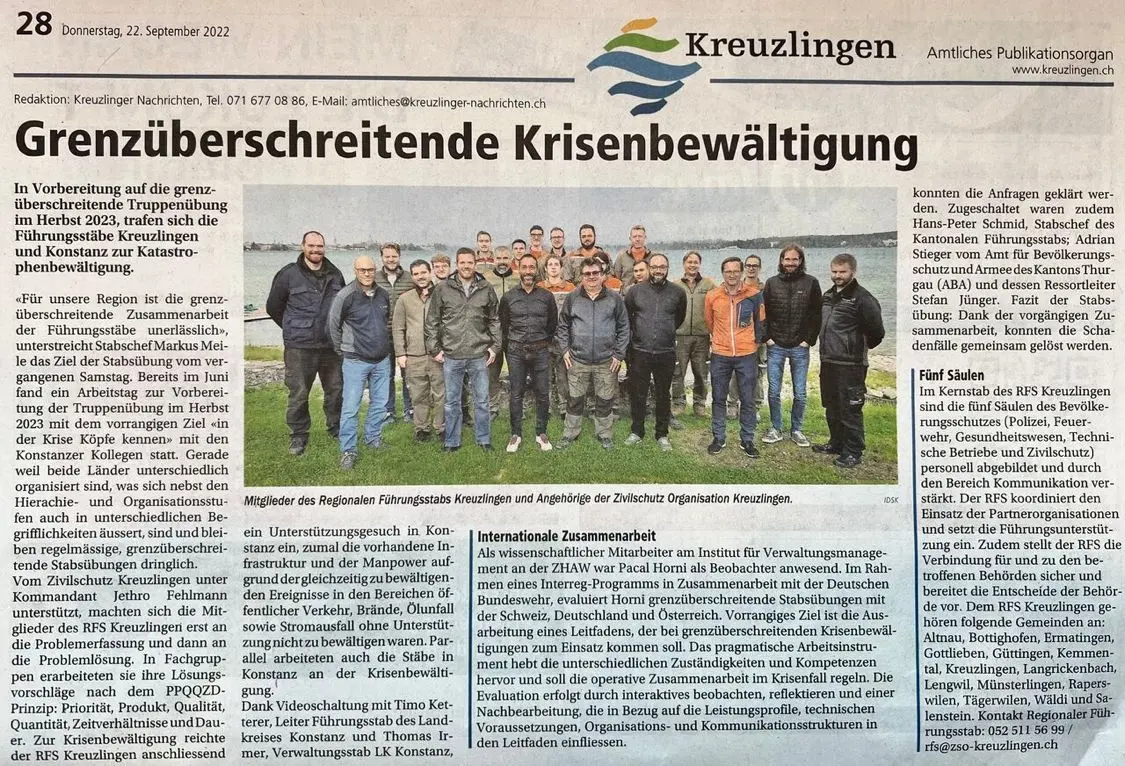Cross-border crisis management Germany - Switzerland - Austria
Description
The aim of the project lies in improving cooperation between public authorities and the emergency services in respect of crisis management. The objective, together with various practice partners from the Alpine Rhine/Lake Constance/High Rhine region, is to develop a common cross-border instrument for undertaking standardised performance evaluations of transnational crisis management measures, and for examining their practicability. Natural, technical and man-made catastrophes pay no heed to national borders, and therefore require common, cross-border remedial action. One of the central challenges facing this partnership and coordination in respect of crisis and catastrophe management is posed by the different administrative levels and structures in the border countries. These are characterised by different responsibilities, legal frameworks and operative practices. Particularly in highly dynamic situations, in which the various stakeholders in civil protection and/or the “blue light organisations” must work together in border regions, organisational action can be rational, structural but also pragmatic.These interactions between various emergency services can often be very challenging. One reason for this is, for example, the fact that different public authorities are responsible for executing the law in the individual countries or states. However, when working in partnership and coordination to manage crises and catastrophes, the deployment of measures so they are most appropriate to the situation, while also being efficient and effective, is always the central focus. This means that a common evaluation of their efficiency, especially in cross-border training and deployments, is essential. In the context of differing perspectives, as well as different understandings of evaluation and different procedures for measuring and evaluating efficiency, it is therefore difficult to construct common, agreed crisis management frameworks. This makes the development of a joint evaluation instrument even more important.With the support of the Zurich University of Applied Sciences and the Universität der Bundeswehr München, a common evaluation instrument for standardised performance assessments of cross-border crisis management measures is being developed. It spans various public authorities (for example German states, Swiss cantons, administrative districts, district and municipal administrations) and emergency services (for example the fire service, police, the German Federal Agency for Technical Relief, civil defence) in the Alpine Rhine/Lake Constance/High Rhine region. In order to develop this instrument, we will be surveying existing findings and information in a structured fashion and taking this as the basis of our work. This includes studies that have been carried out, the experiences of project partners working in crisis management, existing analyses of previous training sessions and deployments, as well as preliminary work that has already been carried out in committees. The instrument being developed together with partners from the Alpine Rhine/Lake Constance/High Rhine region will then be tested for its practicability in the framework of various exercises, before being refined further. Apart from the intensification of dialogue in respect of cross-border crisis management, the result of this common development work in the project, along with the necessary close liaison with the project practice partners and the subsequent practical application – is a sustainable, standardised evaluation instrument extending beyond the scope of this project, and therefore providing a direct benefit to those working in crisis management across the entire region.
Key data
Projectlead
Deputy Projectlead
Project team
Katharina Guirguis, Pascal Horni, Severin Keller, Chantal Menzi
Project partners
Universität der Bundeswehr München
Project status
completed, 11/2020 - 12/2021
Institute/Centre
Institute of Public Management (IVM)
Funding partner
Interreg Alpenrhein-Bodensee-Hochrhein

